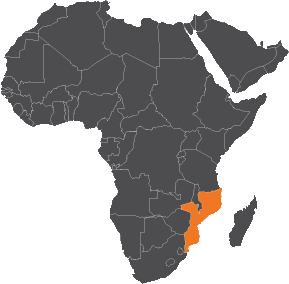Fanelo Ya Mina Institute
Men and Boys for Gender Equality
Homens e Rapazes pela Igualdade do Género
Mozambique, officially the Republic of Mozambique (Portuguese: Moçambique or República de Moçambique, is a country located in the Southeast Africa bordered by the Indian Ocean to the east, Tanzania to the north, Malawi and Zambia to the northwest, Zimbabwe to the west and Swaziland and South Africa to the southwest. The country has an area of 799,380 km2 with a population of 20,366,795 million (according to the Census 2007 estimates), of which 9,842,760 are men and 10,524,035 women - overwhelmingly Bantu people. The largest religion in Mozambique is Christianity, with significant minorities following Islam.
The only official language of Mozambique is Portuguese, which is spoken mostly as a second language by about half of the population. In terms of administrative division, the country has 11 provinces, divided across the Southern, Central and Northern regions and with its capital city Maputo (formerly known as Lourenço Marques prior to independence). The political system inplace is Multiparty Democracy and the currency is the Metical.
Mozambique is endowed with rich and extensive natural resources. The country's economy is based largely on agriculture, but with industry, mainly food and beverages, chemical manufacturing, aluminum and petroleum production, in prominent grow. The country's tourism sector is also registering remarkably grow. The Gross Domestic Product (GDP) is the $US 6.6 billion (2005) and it has grown on an average of 7-8% per year. The Inflation rate is below 10%. However, the country ranks among the lowest in GDP per capita, human development and average life expectancy. In monetary terms, Mozambique has one of the most liberalized exchange rate regimes in Africa. Mozambique is a member of the African Union, Commonwealth of Nations, the Community of Portuguese Language Countries (CPLP), the Southern African Development Community and La Francophonie.
Where we work

Mozambique
Onde Trabalhamos
Moçambique localiza-se na costa sudeste de África, faz fronteira a Norte com a Tanzânia, a Oeste, com o Zimbabwé, Zâmbia e Malawi, a Sul, com a África do Sul e a Suazilândia e é banhado pelo Oceano Índico a Este. O país possui uma área de 799.380 km2 com uma população de 20.366.795 milhões (segundo a estimativas do Censo de 2007), da qual 9.842.760 são homens e 10.524.035 mulheres. A população é composta predominantemente por pessoas de origem Bantu. A maior religião em Moçambique é o Cristianismo, seguindo-se o Islamismo.A língua oficial é o Português. Em termos de divisão administrativa, o país possui 11 províncias, divididas por região Sul, Centro e Norte e tem como capital Maputo (outrora Lourenço Marques). O sistema político vigente é de Democracia Multipartidária. A moeda de transação é o Metical.
Moçambique é dotado de uma extensa gama de recursos naturais. A economia do país é baseada principalmente na agricultura, estando a indústria, principalmente de alimentos e produção de bebidas, assim como produtos minerais - alumínio e petróleo – em crescimento progressivo. O sector do turismo está igualmente em crescente ascensão. O Produto Interno Bruto (PIB) é de $US 6,6 bilhões (2005) e têm estado a crescer numa média acima de 7-8% por ano, chegando mesmo a atingir níveis de 2 dígitos. A inflação está abaixo de 10%. Em termos monetários, Moçambique possui um dos regimes cambiais mais liberalizados de África. Moçambique é membro da União Africana, Comunidade dos Países de Língua Portuguesa (CPLP), da Comunidade para o Desenvolvimento da África Austral e da Organização Internacional da Francofonia.
O país foi explorado por Vasco da Gama em 1498 e colonizada por Portugal a partir de 1505. Depois de mais de quatro séculos de dominação Portuguesa, Moçambique tornou-se independente em 1975, tornando-se a República Popular de Moçambique. Depois de apenas dois anos de independência, o país viveu uma guerra civil intensa e prolongada que durou entre 1977-1992 , entre a FRELIMO (Frente de Libertação de Moçambique) e a RENAMO (Movimento de Resistência de Moçambique). A guerra civil terminou em 1992 e as primeiras eleições multipartidárias do país foram realizadas em 1994.
The country was explored by Vasco da Gama in 1498 and colonized by Portugal from 1505. After over four centuries of Portuguese ruling, Mozambique gained independence in 1975, becoming the People's Republic of Mozambique shortly thereafter. After only two years of independence, the country descended into an intense and protracted civil war lasting from 1977 to 1992 between FRELIMO (Front for Liberation of Mozambique) and RENAMO (Mozambique Resistance Movement). The ruling party, FRELIMO, and the national armed forces FAM (Armed Forces of Mozambique), were violently opposed by the RENAMO which received funding from Rhodesia (former Zimbabwe) and later South Africa. The fight ended in 1992 and the country's first multi-party elections were held in 1994 and the country has remained a relatively stable presidential republic since.



